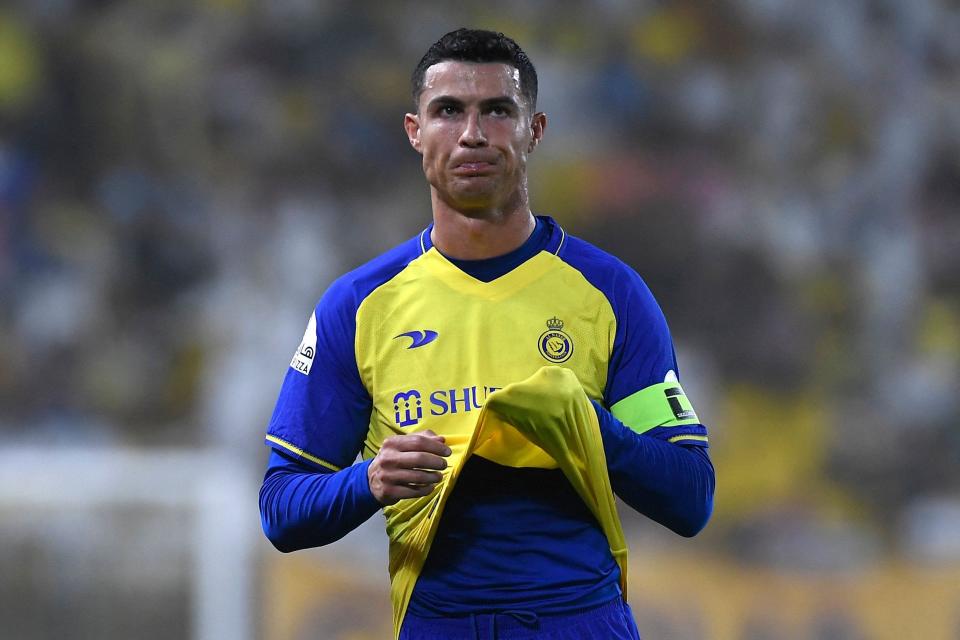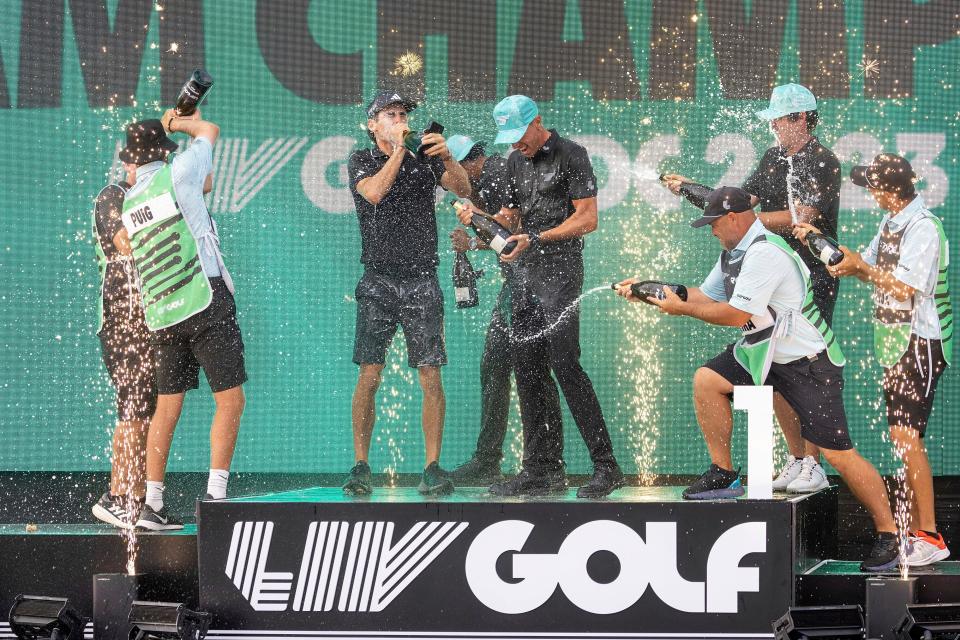Got an image problem? Buy a sports team or invest in a league like PGA-LIV. These Arab countries did
- Oops!Something went wrong.Please try again later.
Alexander the Great and the ancient Greeks did it. The British Empire did it. Hitler's Germany did it.
The use of sports to burnish a country's reputation is not a new tactic, but the practice has been enthusiastically embraced by Arab nations intent on translating their oil wealth into another form of global influence, experts say.
The issue has come to the fore because of the PGA Tour's merger this month with Saudi Arabia-funded LIV Golf. The U.S. Senate has opened an inquiry into the terms of the arrangement.
"International sports was historically institutionalized and governed by the Western world and global North," said Yoav Dubinsky, a sports business researcher at the University of Oregon.
"(It) certainly did not start in the Arab Gulf."
'Golf's ultimate power broker': How Jimmy Dunne helped facilitate PGA Tour-LIV Golf merger
PGA Tour and LIV Golf, the historical playbook
In ancient Greece, cradle of the Olympic Games, warring kings used athletic competition as a means to explore reconciliation. At the start of the 20th century, at the same time as more than 150,000 South Africans were being held in British concentration camps, authorities in London sent cricket and rugby teams to the country to build relationships with local populations. The 1936 Berlin Olympic Games was a Nazi propaganda show.
China plowed ahead with its 2022 Beijing Winter Olympics despite intense scrutiny − in part, perhaps, because of this scrutiny; to meet it head on − from Western nations and human rights groups about mass abuses against Muslim Uyghurs, Tibetans and other ethnic groups − abuses which Beijing strenuously denies.
Years before Russia invaded Ukraine, and as Moscow sought to build a natural-gas pipeline under the Baltic Sea from Russia to Germany, President Vladimir Putin attempted to gain support for the controversial project by pushing a sponsorship deal between Russian state energy company Gazprom and a soccer team that played in the Bundesliga, Germany's professional league, according to Simon Chadwick, an expert on sports and geopolitics at Skema, a France-based business school.

Winter Olympics: Tennis star Peng Shuai is vanishing. Much like China's #MeToo movement
Ambushed, strangled, dismembered
More recently, Saudi Arabia, Qatar and the United Arab Emirates have used sports to paper over a questionable reputation.
Saudi Arabia's leadership − the same government that U.S. intelligences agencies concluded authorized its operatives to ambush, strangle and dismember regime critic Jamal Khashoggi − spent billions this month in the world of golf to engineer the fusion of PGA Tour and LIV Golf. One reason Qatar, ruled by a repressive monarchy, sought to host the 2022 soccer World Cup was to exert its international credentials in a neighborhood where it is plagued by security concerns. (That plan backfired. Instead, attention was drawn to Qatar's discrimination against women, LGBTQ people, journalists, migrant workers and others.) The United Arab Emirates has poured vast sums -- hundreds of millions -- into sponsoring at least half a dozen professional soccer teams cross Europe, as well as hosting lavish sports events from Formula One motor racing to horse-racing events. Nowhere is this perhaps more evident than in the glitzy emirate of Dubai, whose leader kidnapped, drugged and imprisoned his own daughter.
Princess Latifa of Dubai: How the FBI played a role in her capture
"These are economies that are hugely overly dependent on one sector − oil and gas − so they have to diversify and sports is one part of their diversification plans," said Chadwick.
"They are also going through a period of sociocultural and political transformation and the origins of that date back to the Arab Spring uprisings (in 2010). A lot of what these Gulf autocracies are afraid of is 26-year-olds with Molotov cocktails knocking on the doors and saying, 'this country hasn't changed. Far too conservative, far too religious, not enough choice. We don't want you in power anymore.' The sports investment is partly to secure the ruling families of these various countries. The implicit social contract in all of this − the bargain − is: 'we'll give you (soccer star) Cristiano Ronaldo, Formula One, rock concerts, cinema, but don't challenge us."
Still, sports researcher Dubinsky said the deliberate use of sports for "nation-branding and public diplomacy," often referred to as "sportswashing," is something the U.S. is engaged in as well. He said that the U.S. uses public displays of patriotism at sports events and "military traditions" at the Super Bowl and elsewhere to promote national identity and "spread American culture and American capitalism worldwide."
And Chadwick said that often when he travels to the Middle East he is challenged by local stakeholders to explain the difference between an Arab country investing in a European soccer team and the NBA's global promotion.
"Arab Gulf region people will say things to me like, 'Well, what about George Floyd (the Black man murdered by Minneapolis police in May 2020)? So here is a country that shoots people, innocent people dead in the streets. And yet as you travel the world everyone's obsessed with the NBA. Isn't that sportswashing?' Now, I can kind of see the point. But for me, what drives to the very heart of this is: is there intent in this? Did Donald Trump or Joe Biden deliberately use the NBA to cover up George Floyd's murder? Of course not."
It won't only be about Saudi Arabia's image
For Lina Al-Hathloul these are not abstract debates.
Her sister Loujain, a prominent Saudi human rights activist, was released from prison in 2021. But she has a suspended sentence and is banned from traveling outside Saudi Arabia. While in prison, she endured torture, solitary confinement and long periods of incommunicado detention, according to Human Rights Watch.
Among the charges leveled against her when she was arrested in 2018 were sharing information about women's rights in Saudi Arabia with activists overseas. She had also spent years publicly advocating for an end to discrimination against women, including abolishing Saudi Arabia's abusive male guardianship system and a driving ban on women. The driving ban officially ended the same year she was arrested.

"In the short run, the Saudis want to buy a new image," said Lina Al-Hathloul, who works for a human rights group in Belgium that focuses on her home country. "The authorities really want us to think about Ronaldo instead of Khashoggi. It's about fame and glitter and entertainment and hosting international events."
But in the long run, said Al-Hathloul, "it won't only be about image. (Saudi Arabia) will move from soft power to hard power − meaning it will have its tentacles everywhere in terms of governing and different industries. It will reach a point where it has the power and the money, and it won't care about its image anymore or try to pretend."
This article originally appeared on USA TODAY: PGA Tour, LIV Golf: How nations use sports to launder reputations

